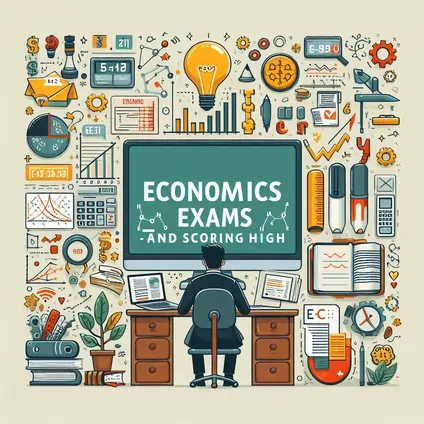Proven Methods to Improve Performance in Economics Examinations

Economics exams can be daunting, demanding more than just memorization—they require sharp analytical skills, critical thinking, and the ability to apply theories to real-world economic scenarios. Whether you're tackling a university-level economics exam or a competitive test, the key to success lies in structured preparation and smart study strategies. With the right approach, you can master complex economic concepts, interpret data effectively, and confidently handle different question formats. This guide serves as your ultimate Economics Exam Helper, offering expert tips on essential topics, study techniques, and exam hall strategies to boost your performance. From understanding micro and macroeconomic principles to solving multiple-choice and essay questions efficiently, we'll walk you through every step of the preparation process. Additionally, if you're looking for Online Exam Help, knowing how to access reliable resources and practice materials can make a significant difference in your results. By implementing these proven strategies, you can enhance your understanding, improve retention, and maximize your exam score. Whether you're aiming for top grades or just want to pass with confidence, this guide will equip you with everything you need to excel.

Understanding the Core Areas of Economics
A solid understanding of economic principles is the foundation of exam success. Here’s a breakdown of the essential areas to focus on during your preparation.
Microeconomics: The Study of Individual Markets
Microeconomics examines how individuals and businesses make decisions regarding resource allocation, production, and consumption.
1.1 Supply and Demand Mechanics
- Understanding how shifts in supply and demand affect price and quantity in a market.
- Analyzing factors that cause changes in equilibrium.
- Exploring concepts like price elasticity and consumer surplus.
1.2 Market Structures and Competition
- Differentiating between perfect competition, monopoly, oligopoly, and monopolistic competition.
- Examining the impact of market power on efficiency and consumer welfare.
- Understanding government regulation in markets with imperfect competition.
1.3 Market Failures and Government Intervention
- Identifying market failures such as externalities, public goods, and asymmetric information.
- Evaluating government interventions like taxation, subsidies, and price controls.
- Analyzing real-world examples of government policies aimed at correcting market inefficiencies.
Macroeconomics: The Study of National and Global Economies
Macroeconomics deals with the overall performance of an economy and its key indicators.
2.1 Economic Growth and Development
- Measuring economic performance using GDP, GNP, and other indicators.
- Understanding factors that drive economic growth and productivity.
- Exploring policies aimed at sustainable economic development.
2.2 Inflation, Unemployment, and Monetary Policy
- Examining different types of inflation and their causes.
- Understanding unemployment rates and their economic implications.
- Analyzing how central banks use monetary policy tools to stabilize the economy.
Applying Economic Theories to Real-World Problems
Economics is not just about theoretical concepts—it’s about solving real-world issues.
3.1 Keynesian vs. Classical Economic Perspectives
- Understanding how these two schools of thought differ in terms of government intervention.
- Evaluating their effectiveness in different economic situations.
3.2 Game Theory and Strategic Decision-Making
- Exploring concepts like Nash equilibrium and dominant strategies.
- Applying game theory to business and economic policymaking.
3.3 International Trade and Comparative Advantage
- Understanding how trade benefits economies through specialization.
- Evaluating trade policies, tariffs, and global trade agreements.
Effective Study Strategies for Economics Exams
Mastering economics requires a structured study plan and effective learning techniques.
Active Learning and Conceptual Understanding
- Engage in discussions, debates, and case study analyses.
- Use real-world examples to relate economic theories to practical scenarios.
- Break down complex theories into simple, digestible concepts.
Practice and Application
- Solve past exam papers and sample questions.
- Take timed quizzes to simulate exam conditions.
- Analyze case studies to apply theoretical concepts in practical settings.
Utilizing Visual Aids and Mnemonics
- Create mind maps to connect related topics.
- Use diagrams to visualize market behaviors and economic trends.
- Develop mnemonics to memorize key definitions and formulas.
Strategies for Handling Exam Questions Effectively
In addition to studying effectively, mastering test-taking techniques is essential.
Tackling Multiple-Choice Questions (MCQs)
- Read all answer choices before selecting the best one.
- Eliminate obviously incorrect answers to improve your chances.
- Watch for keywords that change the meaning of a question, such as "always" or "never."
Approaching Essay and Short-Answer Questions
- Structure answers using the PEEL method: Point, Evidence, Explanation, Link.
- Support arguments with real-world examples and case studies.
- Keep responses clear, concise, and well-organized.
Interpreting Graphs and Data
- Pay attention to labels, scales, and trends in economic graphs.
- Use data to support your answers and draw logical conclusions.
- Relate graphical trends to economic theories and principles.
Exam Day Tips for Maximum Performance
Your preparation is only as effective as your execution on exam day. Here are key strategies to ensure success:
- Read instructions carefully to avoid misinterpretation of questions.
- Manage your time wisely, allocating time based on question weightage.
- Stay calm and focused, moving past difficult questions and returning to them later.
- Review your answers before submitting to catch errors and refine explanations.
By following these structured approaches, you can enhance your understanding, improve retention, and perform confidently in your economics exam. With the right mindset and preparation, achieving top marks is entirely within reach.
Conclusion
Preparing for an economics exam requires a blend of strong conceptual understanding, effective study strategies, and well-developed test-taking skills. By focusing on core economic principles, practicing past papers, and using visual aids, you can enhance retention and analytical thinking. On exam day, time management and a calm approach are crucial for maximizing performance. Remember, economics is not just about memorizing theories but also about applying them to real-world scenarios. With consistent effort, strategic preparation, and confidence, you can excel in any economics exam and build a solid foundation for further studies or professional success in the field of economics.